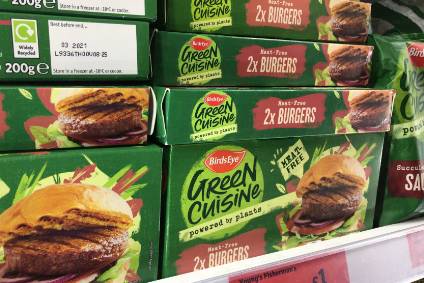
Nomad Foods, the European frozen food business, is already seeing signs of “re-accelerated rates of consumption growth” as governments around the region impose new restrictions to combat the second coronavirus wave.
But CEO Stéfan Descheemaeker, addressing analysts yesterday (5 November) following the issuance of its third-quarter results, said there is so far “less panic buying” than was seen during the early months of the pandemic. Nevertheless, the Birds Eye and Findus brand owner said the company has prepared its supply chain with “high levels of safety stock across the board”.

Discover B2B Marketing That Performs
Combine business intelligence and editorial excellence to reach engaged professionals across 36 leading media platforms.
Like many companies in the packaged food space, Nomad has attracted new customers to its products and brands during the crisis, especially its plant-based Green Cuisine line, and plans to increase spending on advertising and promotional activities in order to retain them.
“Between the significant amount of new trial that we are experiencing and the enhancement that we have made to our portfolio in the Nomad ownership, we believe we are uniquely positioned in a post-Covid world,” Descheemaeker told analysts.
Nomad also scored a new victory with respect to its Green Cuisine brand, which now commands a 7% share of the frozen plant-based category in the UK, its largest market, up from the 5% share the CEO revealed in June.
“We’re building on our position as the number three brand in the space and establishing strong strategic partnerships with many of our top retailers,” he said.

US Tariffs are shifting - will you react or anticipate?
Don’t let policy changes catch you off guard. Stay proactive with real-time data and expert analysis.
By GlobalDataDuring the quarter, Nomad expanded Green Cuisine into a range of chicken-free products, which, the CEO said “are demonstrating strong initial sales velocity early on”. The company also took the brand into new European markets – Portugal, Sweden and Finland – giving the line-up a presence in 12 countries across the region.
While Covid-19 presents the most obvious challenges, Descheemaeker said Nomad is well prepared for Brexit as the UK approaches the end of the transition period when it will sever trading ties with the European Union on 31 December.
“As you can imagine, this combination of Brexit and Covid makes it quite, I would say, interesting and volatile,” he said. “So you have to plan for this. Obviously we’re going to plan in terms of inventory. And obviously it’s a very dynamic situation to change again in a few days. But at this stage, that’s how we’re planning our inventory. But obviously 2021 is based on a deal basis as opposed to a no-deal basis.”
Nomad’s revenues rose 6.7% in the third quarter to 30 September, on a reported basis, to EUR576m (US$683.7m), and were up 5.4% organically.
Adjusted EBITDA climbed 13% to EUR109m, while adjusted profits after tax increased 20% to EUR59m.
CFO Samy Zekhout said organic growth was led by Nomad’s branded retail business, which represents 90% of group sales and grew more than 7% during the quarter. But growth was offset by a “two-percentage-point drag” from foodservice and private label, which declined 23% and 5%, respectively.
Year-to-date revenues rose 9.6% on a reported basis and 8.4% organically to EUR1.86bn. Adjusted EBITDA was up 10% at EUR347m and adjusted profits after tax climbed 13% to EUR195m.
The 2020 EBITDA outlook was maintained “in excess” of EUR460m, but Descheemaeker said the guidance “does not yet include the potential impact from the recent Covid-related restrictions across Europe”.
“Full-year guidance continues to assume organic revenue growth at a high-single digit percentage range,” the Iglo brand owner said in the earnings document commentary.
The CEO also reiterated previous comments around M&A, an area in which Nomad “remains active”.
“It’s really focused on frozen food consolidation in Europe. So that’s the real backdrop. You have to be ready because you have to be flexible, you have to be prepared,” Descheemaeker said. “And then from the moment an owner decides to sell, you have to be there. As simple as that.”





